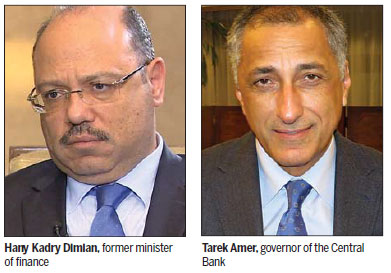Reforms are core pillars for robust growth
During the El Sisi administration's first two years in office, ministers have undertaken a series of reforms to reduce energy subsidies and the national deficit, increase the tax base and improve social safety nets, while at the same time introducing attractive tax incentives for investors.
Not only have the initiatives boosted GDP growth into single-digit territory, they have been warmly received by major financial institutions such as the World Bank and International Monetary Fund. In addition, several leading credit rating agencies have lifted their evaluations and outlooks for the country's economic prospects and fiscal climate.
"The government exerts great efforts to accelerate the achievement of economic take-off to be reflected in standards of living," said former minister of finance Hany Kadry Dimian in a positive update on a new financial program that rearranges spending priorities and supports social protection.
"Spending rationalization policies are based on procedures to assure expenditures fulfill the purposes of funding social-dimensional programs, and so increase spending on education and health to fulfill constitutional entitlements," Dimian said.
In October 2015, President Abdel Fattah El Sisi appointed Tarek Amer as governor of the Central Bank of Egypt (CBE) following the resignation of Hisham Ramez. The bank's main objectives and functions include realizing price stability and ensuring the soundness of the banking system; formulating and implementing monetary, credit and banking policies; and supervising the banking and financial services sector.
Solid progress
The appointment was well-received as Amer is well respected within the banking and financial sector through his previous time with the CBE and his impressive resume features roles that have seen him develop extensive administrative and banking knowledge and expertise.
A few weeks before Amer's appointment, a team of financial experts from the IMF spent a week in Cairo assessing the country's economic performance and holding high-level talks with government officials, leaders from the private sector and bosses of public authorities.
Following the visit, mission head Chris Jarvis said: "There have been positive economic developments since the mission's last visit. Some of the pledges made at the Egypt Economic Development Conference in March 2015 are already in the implementation phase. In August, the parallel Suez Canal was opened after just one year of work; and a major gas find in Egyptian waters bodes well for the country's outlook in the medium term.
"The country's return to international markets was marked by the successful issuance of a $1.5-billion Eurobond. Macroeconomic figures also point to some improvement, with growth rebounding to 4.2 percent in 2014-15, and inflation has declined. Financial soundness indicators point to the continued resilience of the banking sector, and the authorities are making efforts to deepen financial inclusion," Jarvis said.
"The authorities succeeded in significantly reducing the underlying budget deficit despite a decline in foreign grants, thanks to a wide-ranging set of reforms including energy subsidy reforms, and progress in containing the wage bill and increasing tax revenues."
InFocus provided this story.

(China Daily 06/03/2016 page5)














